- Home
- Stephen Hawking
George's Secret Key to the Universe Page 8
George's Secret Key to the Universe Read online
Page 8
George ground his teeth in frustration at the way adults twisted everything to make it sound like they were always right, and then dragged his feet up the stairs to his room. The world suddenly seemed a much more boring place.
• • •
George knew he was going to miss Cosmos, but what he didn’t expect was that he would miss Annie too. At first he was pleased to be banned from seeing her—it was good to have a punishment that stopped him from doing something he didn’t want to do anyway. But after a while he found himself looking for the flash of her golden hair. He told himself he was just bored. He was grounded, so he couldn’t go and see any of his other friends, and there wasn’t much for him to do at home that was any fun—his mom wanted him to weave a rug for his bedroom, and his dad attempted to get him interested in his homemade electricity generator. George tried to be enthusiastic, but he felt rather flat.
The only bright star in his life was that he’d seen a poster at school advertising a science-presentation competition. The first prize was a computer! George desperately wanted to win. He spent ages trying to write a really good talk about the wonders of the Universe and drawing pictures of the planets he’d seen on the comet ride. But no matter how hard he tried, he just couldn’t seem to get the words right. Everything sounded wrong. Eventually he gave up in frustration and resigned himself to a boring life forever and ever.
• • •
But then at last something interesting happened. One gray autumn afternoon at the end of October—the slowest and dullest month he had ever lived through—George was loafing around in the backyard when he noticed something unusual. Through a small round hole in the fence he saw something very blue. He went over to it and pressed his eye socket to the fence. From the other side he heard a squeak.
“George!” said a familiar voice. He was eye to eye with Annie.
“We’re not supposed to be talking to each other,” he whispered through the fence.
“I know!” she said. “But I’m so bored.”
“You’re bored! But you’ve got Cosmos!”
“No, I haven’t,” said Annie. “My dad has locked him up so I can’t play with him anymore.” She sniffed. “I’m not even allowed to go trick-or-treating for Halloween this evening.”
“Me neither,” said George.
“I’ve got such a pretty witch’s costume too,” said Annie sadly.
“My mom’s making pumpkin pie right now,” George told her glumly. “I bet it’ll be horrible. And when she’s finished, I’ll have to go and eat a slice of it in the kitchen.”
“Pumpkin pie!” said Annie longingly. “That sounds really good. Can I have your slice if you don’t want it?”
“Yeah, but you’re not allowed in my kitchen, are you? After what happened … last time we played together.”
“I’m really sorry,” said Annie. “About the comet ride and the asteroids and the jets of gas and my dad getting angry with you. And everything. I didn’t mean it.”
George didn’t reply. He’d thought of so many angry things to say to Annie, but now that he was nearly face-to-face with her, he didn’t feel like saying any of them.
“Oh dear.” Annie sniffed.
From the other side of the fence, George thought he heard the noise of crying. “Annie?” he called quietly. “Annie?”
Brrreeeewwwhhh! George heard a sound like someone furiously blowing their nose.
He ran down the length of the fence. His dad had started to mend the hole where Freddy had broken through into Next Door, but he’d got distracted halfway through and had forgotten to finish the job. There was still a little gap, maybe large enough for a small person to squeeze through.
“Annie!” George poked his head through the space. He could see her on the other side now, wiping her nose on her sleeve and rubbing her eyes. Wearing normal clothes, she no longer looked like a strange fairy child or a visitor from outer space. She just looked like a lonely little girl. Suddenly George felt really sorry for her. “Come on!” he said. “Climb through! We can hide together in Freddy’s sty.”
“But I thought you hated me!” said Annie, scampering down to the hole in the fence. “Because of—”
“Oh, that!” said George carelessly, as though he’d never given it a moment’s thought. “When I was a little kid, I would have minded,” he said grandly. “But I don’t now.”
“Oh,” said Annie, whose face was blurred by tears. “So, can we be friends?”
“Only if you climb through the fence,” teased George.
“But what about your dad?” asked Annie doubtfully. “Won’t he be angry again?”
“He’s gone out,” said George. “He won’t be back for hours.” In fact, that morning George had been pretty glad to be grounded. Sometimes on Saturdays his dad took George with him when he went on global-warming protest marches. When he was younger, George had loved the marches—he’d thought that walking through the center of town carrying a sign and shouting slogans was great. The eco-warriors were fun and sometimes they would give George piggyback rides or mugs of steaming homemade soup. But now that George was older, he found going on marches a bit embarrassing. So when his dad had sternly told him that morning that, as part of his ongoing punishment, he would have to miss that day’s protest march and stay at home, George pretended to be sad so as not to hurt his dad’s feelings. But secretly he had breathed a sigh of relief.
“Come on, Annie, jump through,” he said.
The pigsty wasn’t the warmest or the most comfortable place to sit, but it was the one best hidden from angry grownup eyes. George thought Annie might protest at the smell of pig—which wasn’t as strong as people tended to think—but she just wrinkled her nose and then snuggled down in some straw in the corner. Freddy was asleep, his warm breath coming out in little piggy snores as he dozed, his big head resting on his hooves.
“So, no more adventures?” George asked Annie, settling down next to her.
“Not likely,” said Annie, scuffing her sneakers against the pigsty wall. “Dad says I can’t go into outer space again until I’m really old, like twenty-three or something.”
“Twenty-three? But that’s ancient!”
“I know,” sighed Annie. “It’s forever away. But at least he didn’t tell my mom. She would have been really angry. I promised her I’d look after Dad and stop him from doing anything silly.”
“Where is your mom anyway?” asked George.
“My mom,” said Annie, tilting her head in a way he had come to recognize, “is dancing Swan Lake with the Bolshoi Ballet in Moscow.”
In his sleep, Freddy gave a loud snort.
“No, she isn’t,” said George. “Even Freddy knows that’s not true.”
“Oh, all right,” agreed Annie. “She’s taking care of Granny, who isn’t very well.”
“Then why didn’t you say so?”
“Because it’s much more interesting to say something else. But it was true about outer space, wasn’t it?”
“Yes, it was,” said George. “And it was amazing. But …” He paused.
“What?” said Annie, who was braiding Freddy’s straw.
“Why does your dad go there? I mean, why does he have Cosmos? What’s he for?”
“Because he’s trying to find a new planet in the Universe.”
“What sort of new planet?” asked George.
“A special one. One where people could live. Y’know, in case the Earth gets too hot.”
“Wow! Has he found one?”
“Not yet,” said Annie. “But he keeps looking and looking, everywhere across all the galaxies in the Universe. He can’t stop until he finds one.”
“That’s amazing. I wish I had a computer that could take me across the whole Universe. Actually, I wish I had a computer at all.”
“You don’t have a computer?” Annie sounded surprised. “Why not?”
“I’m saving up for one. But it’s going to take years and years and years.”
“T
hat’s not much good, is it?”
“So,” said George, “I’m entering a science competition, and the first prize is a computer, a really huge one!”
“What competition?”
“It’s a science presentation. You have to give a talk. And the person who gives the best one wins the computer. Lots of schools are taking part.”
“Oh, I know!” said Annie, sounding excited. “I’m going to it with my school—it’s next week, isn’t it? I’m staying at Granny’s all next week, but I’ll see you at the competition.”
“Are you entering?” George asked, suddenly worried that Annie, with her interesting life, scientific know-how, and vivid imagination, would pull off a presentation that made his own sound about as exciting as cold rice pudding.
“No, of course not!” said Annie. “I don’t want to win a stupid computer. If it was some ballet shoes, then that would be different … What are you going to talk about?”
“Well,” said George shyly, “I’ve been trying to write something about the Solar System. But I don’t think it’s very good. I don’t know very much about it.”
“Yes, you do!” said Annie. “You know lots more than anyone else at school does. You’ve actually seen parts of the Solar System, like Saturn, Jupiter, asteroids, and even the Earth from outer space!”
“But what if I’ve got it all wrong?”
“Why don’t you get Dad to check it for you?” suggested Annie.
“He’s so mad at me,” said George sadly. “He won’t want to help me.”
“I’ll ask him this evening,” said Annie firmly. “And then you can come by after school on Monday and talk to him.”
At that moment there was a gentle tap on the roof. The two children both froze as the door to the pigsty swung open.
“Hello?” said a nice voice.
“It’s my mom!” George mouthed silently to Annie.
“Oh no!” she mouthed back.
“Trick or treat?” said George’s mom.
“Treat?” said George hopefully. Annie nodded.
“Treat for two?”
“Yes, please,” replied George. “For me and, um, Freddy, that is.”
“Freddy’s a funny name for a girl,” said George’s mom.
“Oh, please, George’s mom!” Annie burst out. She couldn’t stay silent any longer. “Don’t let George get into more trouble! It isn’t his fault!”
“Don’t worry,” said George’s mom in the kind of voice that they both knew meant she was smiling. “I think it’s silly that you can’t play together. I’ve brought you both a snack—some nice broccoli muffins and a slice of pumpkin pie!”
With a squeak of delight, Annie fell on the plateful of lumpy, funny-shaped muffins. “Thank you!” she mumbled through a mouthful of muffin. “These are delicious!”
Meanwhile, on the other side of town, George’s dad was enjoying his environmental protest march. Holding up huge signs and shouting slogans, the campaigners charged across the shopping district, batting the crowds aside. “The planet is dying!” they yelled as they marched to the town square. “Recycle plastic bags! Ban the car!” they bellowed to surprised passers-by. “Stop wasting the Earth’s resources!” they yelled.
When they reached the middle of the square, George’s dad jumped up onto the base of a statue to give a speech.
“Now is the time to start worrying! Not tomorrow!” he began. No one heard him, so one of his friends handed him a megaphone. “We don’t have that many years left to save the planet!” he repeated, this time so loudly that everyone in the area could hear him. “If the Earth’s temperature continues to rise,” he went on, “by the end of the century, flood and droughts will kill thousands and force over two hundred million people to flee from their homes. Much of the world will become uninhabitable. Food production will collapse, and people will starve. Technology will not be able to save us. Because it will be too late!”
A few people in the crowd were clapping and nodding their heads. George’s dad felt quite surprised. He’d been coming to these marches for years and years, handing out flyers and giving speeches. He’d got quite used to people ignoring him or telling him he was crazy because he believed that people owned too many cars, caused too much pollution, and relied too heavily on energy-consuming machines. And now, suddenly, people were listening to the environmental horror story he’d been talking about for so long.
“The polar ice caps are melting, the seas are rising, the climate is getting warmer and warmer,” he went on. “The advances in science and technology have given us the power to destroy our planet! Now we need to work out how to save it!”
By now, a little group of Saturday shoppers had stopped to hear what he had to say. A small cheer went up from the people listening.
“It’s time to save our planet!” yelled George’s dad.
“Save our planet!” the campaigners shouted back at him, one or two of the shoppers joining in. “Save our planet! Save our planet!”
As a few more people cheered, George’s dad lifted his arms in the air in a victory salute. He felt very excited. At last people were taking some notice of the terrible state the planet was in. He suddenly realized that all those years he had spent trying to raise public awareness were not lost after all. It was starting to work. All the eco-friendly groups had not protested in vain. When the cheers trailed off, George’s dad was about to speak again when suddenly, out of nowhere, a huge custard pie sailed across the heads of the crowd and hit him right in the face.
There was a moment of shocked silence, and then everyone burst out laughing at the sight of poor George’s dad standing there, with runny cream dripping down his beard. Wriggling through the onlookers, a group of boys dressed in Halloween costumes started running away from the square.
“Catch them!” shouted someone in the crowd, pointing to the band of masked figures sprinting away as fast as they could, laughing their heads off as they went.
George’s dad didn’t really mind—after all, people had been throwing things at him for years while he made his speeches; he’d been arrested, jostled, insulted, and thrown out of so many places in his efforts to make people understand the danger the planet faced, that one more custard pie didn’t upset him very much. He just wiped the sticky goo out of his eyes and got ready to continue talking.
A few of the other green campaigners ran after the group of demons, devils, and zombies, but they were soon left behind, staggering and gasping for breath.
When the boys realized that the grownups had given up the chase, they came to a halt.
“Ha-ha-ha-ha,” snickered one of them, ripping off his zombie mask to reveal the features of Ringo. His real face wasn’t much more attractive than the rubber mask.
“That was great!” gasped Whippet, stripping off his black-and-white Scream mask. “The way you threw that pie, Ringo!”
“Yeah!” agreed an enormous devil, swishing his tail and waving his pitchfork. “You got him right on the nose!” Judging by his great size, it could be none other than Tank, the boy who just couldn’t stop growing.
“I love Halloween,” said Ringo happily. “No one will ever know it was us!”
“What should we do next?” squeaked Zit, who was dressed as Dracula.
“Well, we’ve run outta pies,” said Ringo. “So we’re going to play some tricks now, some good ones. I’ve got some ideas …”
• • •
By late that afternoon, the boys had given quite a few people living in their small town a bad fright. They’d shot an old lady with colored water from a toy pistol; they’d thrown purple flour over a group of small kids; and they’d set off firecrackers under a parked car, making its owner think they’d blown it up. Each time, they had caused as much havoc as possible and then scampered away very quickly before anyone could catch them.
Now they had reached the edge of town, where the houses started to spread out. Instead of narrow streets with rows of snug little cottages, the buildings got bigger and
farther apart. These houses had long green lawns in front of them, with big hedges and crunchy gravel driveways. It was getting dark, and some of these enormous houses, with their blank windows, columns, and fancy front doors, were starting to look quite eerie in the dim light. Most of them were dark and silent, so the gang didn’t even bother ringing their bell. They were just about to give up for the day, when they came to the very last house in the town, a huge rambling place with turrets, crumbling statues, and old iron gates hanging off their hinges. On the ground floor, lights were blazing from every window.
“Last one!” announced Ringo cheerfully. “So let’s make it a good one. Tricks ready?”
His band of boys checked their stash of trick weapons and hurried along behind him up the weed-covered driveway. But as they approached the house, they all noticed a strange eggy smell, which grew stronger as they approached the front door.
“Pooo-eeey!” said the huge devil, holding his nose. “Who did that?”
“Wasn’t me!” squawked Zit.
“He who smelt it, dealt it,” said Ringo ominously. The smell was getting so overpowering now, the boys were finding it hard to breathe. As they edged toward the front door—where the paint was peeling off the woodwork in ribbons—the air itself became thick and gray. Hand over his mouth and nose, Ringo reached forward and pressed the giant round doorbell. It made a sad, lonely clanging noise, as though it wasn’t used very often. To the boys’ surprise, the door opened a crack and fingers of yellowish gray smoke curled through the narrow gap.
“Yes?” said an unpleasant voice that was somehow familiar.
“Trick or treat?” croaked Ringo, almost unable to speak.
“Trick!” cried the voice, throwing the door wide open. For a fleeting second the boys saw a man wearing an old-fashioned gas mask standing in the doorway. Another second, and great clouds of stinky yellow and gray smoke rolled out through the open door and the man vanished from view.
“Run!” Ringo yelled. His gang didn’t need telling twice—they had already turned tail and were rushing back through the thick smog. Panting and wheezing, they staggered down the drive, through the gates, and onto the pavement. They ripped off their Halloween masks so they could breathe better after choking on the smelly smoke. But Ringo wasn’t with them—he had tripped in the driveway and fallen onto the gravel. He was struggling to his feet when he saw the man from the big house walking toward him.

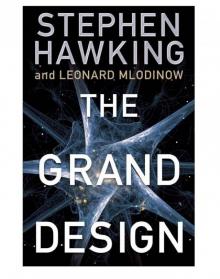 The Grand Design
The Grand Design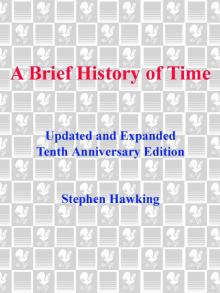 A Brief History of Time
A Brief History of Time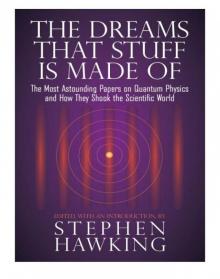 The Dreams That Stuff is Made of
The Dreams That Stuff is Made of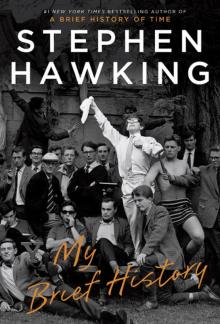 My Brief History
My Brief History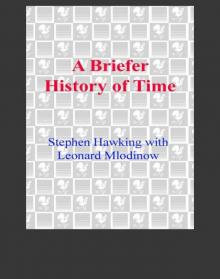 A Briefer History of Time
A Briefer History of Time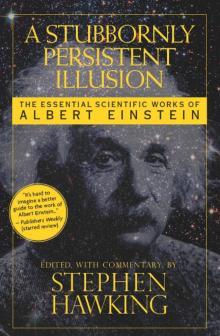 A Stubbornly Persistent Illusion
A Stubbornly Persistent Illusion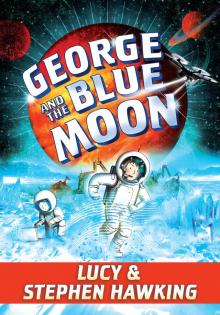 George and the Blue Moon
George and the Blue Moon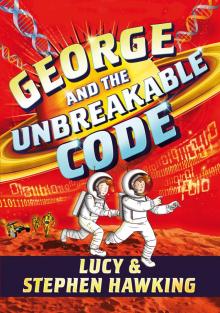 George and the Unbreakable Code
George and the Unbreakable Code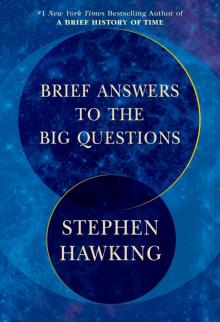 Brief Answers to the Big Questions
Brief Answers to the Big Questions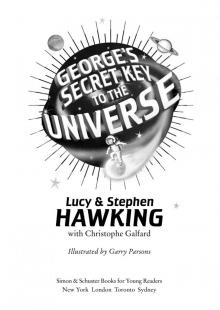 George's Secret Key to the Universe
George's Secret Key to the Universe